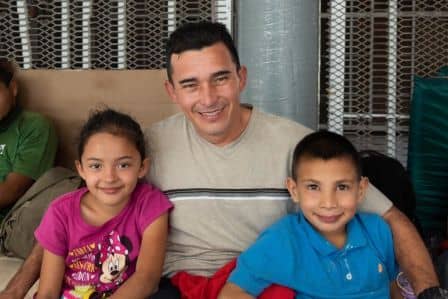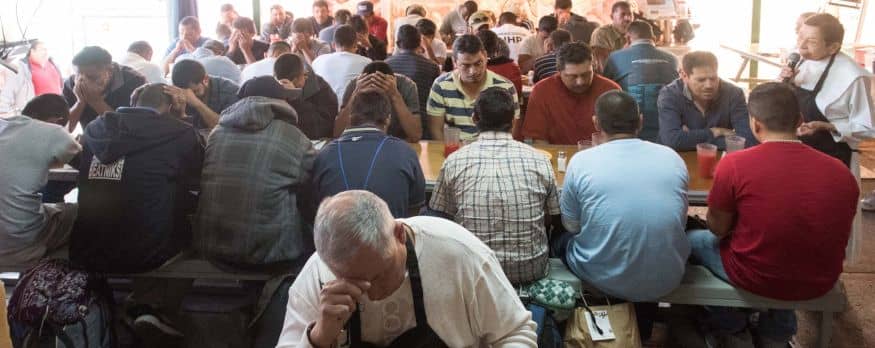This website uses cookies so that we can provide you with the best user experience possible. Cookie information is stored in your browser and performs functions such as recognising you when you return to our website and helping our team to understand which sections of the website you find most interesting and useful.
Journeying with the Outcast of the World
The U.S.–Mexico border runs almost 2,000 miles from the Gulf of Mexico to the Pacific Ocean. American officials estimate 500,000 people cross the border each year without authorization. These individuals are men, women and children that are forced to leave their homes because of violence in their communities and lack of economic opportunity to provide a dignified life for their family.

Those who arrive at the border encounter significant violations of their rights to safety, asylum, just treatment, property, and health by Mexican officials and U.S. officials alike. Others who have been living in the United States for decades are separated from their families through deportation and have to face difficult decisions about whether to remain in Mexico or attempt to reunite with their children.
In January of 2009, a group of church organizations (The California Province of the Society of Jesus, Jesuit Refugee Service/USA, the Missionary Sisters of the Eucharist, the Mexican Province of the Society of Jesus, the Diocese of Tucson and the Diocese of Nogales) got together to start the Kino Border Initiative (KBI).
Rooted in the Jesuit tradition and named for Fr. Eusebio Francisco Kino, a 17th-century Jesuit missionary who ministered in the Arizona border region, KBI seeks to humanize the process of migration within the U.S.-Mexico border through:
- Direct humanitarian assistance and accompaniment for migrants,
- Social and pastoral education for communities on both sides of the border, and
- Participation in collaborative networks that engage in research and
advocacy to transform local, regional, and national immigration
policies.
The GC36 and Fr. General constantly remind us to be colleagues in our mission of faith, justice and reconciliation. Kino Border Initiative collaborates with different Jesuit structures, institutions and projects that serve as companions in deepening their mission and extending their ministry.

Kino Border Initiative was founded as a fully binational organization, which means that it is a bi-provincial project within the Society of Jesus. That bi-nationality is key to the richness of KBI’s mission and permeates every aspect of its work. Today, KBI is actively involved in the Jesuit Migration Network of Central America and North America in both advocacy and case referral work. KBI also collaborates with the Ignatian Solidarity Network in the United States in developing strategy, providing resources, and planning events that engage Jesuit institutions in education and advocacy.
In its educational and advocacy mission Kino Border Initiative works closely with Jesuit universities, with an understanding of the need for consciousness efforts on both personal and structural levels. For example, it welcomes weeklong immersion trips which brings students, faculty and staff close to the margins and help them understand at a deep level the challenges facing migrants and all those who live at the border. They meet with a spectrum of people that are involved in immigration, including police, refugees, immigrants, and people who are involved in the caring of the migrant population. The immersion provided by KBI gives these individuals a very holistic perspective of the social justice issues surrounding the border.
Support is also given to on campus student initiatives through “border initiative” student clubs and advocacy video series that advocate for border and migration humanization and rights.
During the year, KBI advocates about the situation at the border and their work at Jesuit Universities all over the world, such as: Fordham University, Universidad Iberoamericana Ciudad de México, Creighton University, University of Scranton, Georgetown University, University of San Francisco, Santa Clara University and more.
Links of interest:
Donate to Kino Border Initiative: https://www.kinoborderinitiative.org/give/
Kino Border Initiative: https://www.kinoborderinitiative.org/
Story of migrant (Fredy): https://www.kinoborderinitiative.org/fredys-story/
Story of migrant (Cinthyas): https://www.kinoborderinitiative.org/cinthyas-story/
Bellarmine Chapel welcomes a Salvaran Family: https://ignatiansolidarity.net/campaignforhospitality/2018/05/17/encounter-hospitality-bellarmine-chapel/
This post has been originally published at the IAJU website based on an interview with Joanna Williams, Director of Education and Advocacy, at Kino Border Initiative (KBI).





